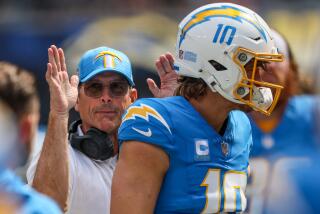STEROIDS : Bigger, Stronger, Faster . . . for Some Athletes, Benefits of Anabolic Drugs Are Worth the Gamble
- Share via
He can make a hit. He can take a hit. He can interfere with the trickiest of pass patterns and stop the quickest of running backs who have slipped past the defensive line.
Bill Smith, who did not want his real name used, loves to play football. He loves the camaraderie of team competition and the popularity that comes with it. It makes him feel good.
So good, that before his senior season at Newport Harbor High School, Smith made a difficult choice. He decided to take anabolic steroids, drugs he thought would help him become big enough to remain a linebacker.
His 5-foot 10-inch, 175-pound body was better suited to be a defensive back, but Smith liked the action of playing linebacker, a position he had played the three previous seasons.
So, he took the drugs without his coaches’ or parents’ knowledge. He took them without doctor’s care. He took them on the advice of friends and what he read in magazines and watched on television. He got them from a friend of a friend in a local gym.
Bill Smith is not alone. He is one of a growing number of American high school athletes who have used anabolic steroids in hopes of enhancing their performances.
“It’s running rampant in the schools,” said Gordon Scott of the Food and Drug Administration’s Los Angeles office.
“You can take any high school football team around here and you’ll find four or five guys using it,” said one user who asked not to be identified.
Smith, now 19, had a vague awareness of the risks involved in steroid use, as did four other steroid users interviewed by The Times. They had done their homework, they said. They consider themselves clean kids. They were not, and are not, recreational drug users. But taking steroids was different. They did so with high-minded purpose. They did it to play college football.
Said one who will play at a Division I school in the fall: “I was concerned about it (the potential side effects). But my concern for getting a scholarship and paying for my college education was a little more.”
A teen-ager’s belief that he takes steroids as a means to aspire may separate him from the typical high-school drug user. The belief he does so with that protective shield of immortality called youth does not.
“I’m using them for a purpose,” said one high school student from Irvine. “I’m not going to be like some people who get on these head trips that they have to keep on them to keep getting bigger. Football means a lot to me. I think more of football than the consequences.”
Geoff DeLapp, football recruiting coordinator for the University of Hawaii, said that players are under a misconception if they consider drug use an aid to a college scholarship.
“Any person using steroids would affect our decision to recruit them,” he said. “We would be inclined not to recruit that person.”
DeLapp said he believes that players can get bigger and stronger without drugs, and that coaches wouldn’t ask them to use artificial means to make gains.
But Kevin Ringhofer, a supervisor of the nationally acclaimed Hazeldon Cork youth program in Minneapolis, suggests there is covert pressure for young athletes to take steroids. He said youngsters see the drug as the advantage they need to gain a college recruiter’s attention.
Ellen Morehouse, a clinical social worker in White Plains, N.Y., sees a parallel between the upswing in steroid use and cocaine use.
“Cocaine is a stimulate drug, it help makes you feel on top of things, in control,” she said. “In other words, there is less of a tolerance to put up with who you are and your personal behavior. I see steroids as being very similar. High school boys are not willing to accept the fact that they might be 5-1 instead of 6-1. Or that they don’t have the same muscles and quickness as some of the idols they are trying to emulate athletically. It’s like, ‘I’m not happy with who I am so why not let me take a chemical to take care of that.’ ”
Before turning to steroids, Smith had tried to bulk himself up naturally. He went on a serious weightlifting program in order to prepare for the season.
“But it just didn’t seem to happen fast enough for me because I only had six months,” he said.
He needed a quick fix, and he knew where to get it: the local gym.
There, in the shiny reflection of barbells and dumbbells, Smith found a cornucopia of anabolics just waiting for the taker.
‘Roids (steroids), D-Ball (Dianabol), Bol (Bolosterone), Juice, Sauce and Test (testosterone).
An anxious Smith entered this world of drugs and muscle and emerged with Anavar, an oral steroid that gives strength without excessive muscular enlargement. After three months he saw the result he desired--he gained 42 pounds (he weighed 217)--and had incredible strength.
“I felt real good,” he said.
Smith’s scenario has a common thread with other high school users. Two football players from the city of Irvine used steroids purchased at a local gym last fall. Both had weight and strength gains. But neither wanted to be quoted publicly or associated with their current high school.
Their discretion is understandable. Steroids are underground, in the black market, exchanged less openly than marijuana and cocaine, they say.
In this country, possession of anabolic steroids without a doctor’s prescription is illegal. Yet, the athletes are getting them either by going to pharmacies in Mexican cities such as Tijuana, through dealers in local weightlifting gymnasiums or from their doctors.
“At the time I was taking them, I would much rather admit that I used cocaine than steroids,” said Brad Long, a former Chapman College hammer thrower.
Long, who said he took steroids at high dosages for at least four years and gained more than 50 pounds, warns that the teens need to become more cautious when using the drugs. He says they should undergo regular blood tests as he did with Dr. Robert Kerr, a San Gabriel sports-medicine physician who Long said gave him steroid prescriptions. Kerr has advocated athletes taking steroids under a doctor’s scrutiny on national television and in newspaper articles.
Long, 29, who said he learned about steroids as a youth while training at a gym in Orange, often is asked about steroids when he trains. He said he tells teen-agers to go as far naturally with their bodies as they can before trying the drugs. He also tells them steroids are safe if taken properly with regular blood tests.
Long said he took 60 tablets of Anavar and 30 tablets of Dianabol daily for three to four weeks, and added injections of testosterone every other day during the month’s cycle. He said he had no problems and has no concern about his future.
“I don’t believe the doctors,” he said. “They don’t have the information, they don’t know all the side effects. I’m not worried about having problems in 10 years because I took care when I did it.”
The athlete who received a Division I scholarship also stacked--taking two types of steroids at once--and also is not overly concerned about his health.
“I just don’t think it is poison,” he said. “This stuff is on the market. This stuff is made to give to people. I don’t think they’d give it to a guy . . . if they knew he was going to get liver cancer for sure and die.”
The side effects may not result in death, but those interviewed all said they experienced increased aggression, which led to hostility.
“It just made me into something I’m not,” Smith said. “I got pretty violent. You know, you get in fights while you’re in high school, but I’d go out looking for them and I just wasn’t that type of guy. I didn’t know what. I don’t know why or how. I just wanted to hurt somebody.”
Smith, a defensive back at Golden West College now, said he quit taking the drugs when he was moved from linebacker to defensive back in college. With steroids, he said he was too big to be a defensive back.
When he reflects, Smith thinks perhaps he hurt himself more than anyone by taking steroids.
“It felt good, it felt right, but afterward you feel just terrible, not only that you did it, but you physically feel just terrible about yourself,” he said. “I just felt myself slowly slipping away from what I wanted to be.
“I feel that I’ve cheated the whole football world by doing this. That big old empty feeling inside where you just sit there and go, ‘Whoa, what did I do to everybody?’ This is a game played by men where it’s man against man not drug versus drug. These guys are sitting there, like myself, who go beyond what their potential is and I can’t agree with that.”
The other users said they did not feel bad about making gains with artificial help.
“If you’re in a sport where size and strength are important, you don’t have a whole lot of choice,” said Long, the track athlete. “I got to go through college for free and compete against some of the country’s best throwers. I would never have been able to pull it off without steroids.”
Said another: “There’s nothing wrong with using them when you know the other guy on the line of scrimmage is taking them and if you don’t, he’s going to beat you.”
Smith understands how they feel. But now he wants to beat opponents, naturally.
More to Read
Get our high school sports newsletter
Prep Rally is devoted to the SoCal high school sports experience, bringing you scores, stories and a behind-the-scenes look at what makes prep sports so popular.
You may occasionally receive promotional content from the Los Angeles Times.






